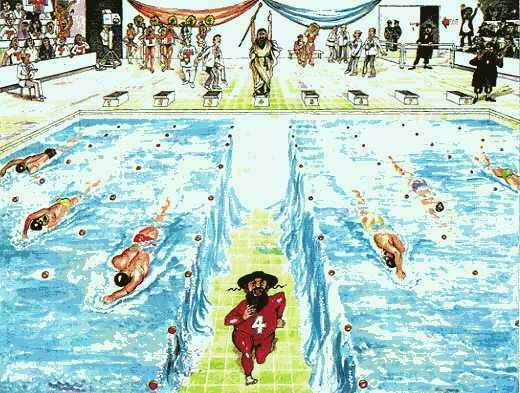|
Jewish Olympics
Jewish Olympics:
I find this cartoon, beyond its initial humor, to be rich with meaning. Comments are welcome, so long as they aren’t anti-Semitic. :-)
Comments
The Lord certainly acted in such a manner for His people… Do you know who wrote it, and where it first appeared? Just curious. Posted by: Will S. on September 10, 2003 4:34 AMEr, not “wrote it”, but “drew it”, I meant to say… Posted by: Will S. on September 10, 2003 4:35 AMIt was sent to me by a third party. I’ll try to find out who created it. Posted by: Lawrence Auster on September 10, 2003 7:53 AMand in both instances they ran the race and held up the gold. Posted by: abby on September 10, 2003 4:35 PMThe fellow is actually Mark Spitz - remember the guy? As he grew older he naturally lost much of his swimming prowess and, with it, the source of income. He became quite depressed and decided to consult a local rabbi who suggested he join a yeshiva. It was there where he learned some new (actually quite old) technique. Posted by: Tadeusz Hanski on April 21, 2004 10:37 AMMr. Hanski’s comment is a little too obscure for me. But perhaps some people regard the cartoon itself as too obscure. :-) Posted by: Lawrence Auster on April 21, 2004 12:16 PMClearly Mr Hanski is still living in the 1970s, and must wonder how the composer of Godspell http://www.amnation.com/vfr/archives/002250.html#15635 Posted by: Reg Cæsar on April 22, 2004 3:16 AMThe drawing indicates eight blocks but only six swimmers are shown in competition. Given that two are either ahead in the drawing and not shown, then the Rabbi becomes the ninth person illustrated. Artistically, it makes no sense. Are we forced to read into what is not there? Posted by: joan vail on April 22, 2004 10:56 AMThere are eight blocks, and seven racers including the rabbi; the swimmer in the far right lane is not shown. The humor of this illustration, which even some very intelligent people I know have missed, is that the figure at the back of the pool is either Moses or the Lord who is dividing the waters so that the rabbi can run the race on dry land. Posted by: Lawrence Auster on April 22, 2004 11:09 AMLawrence, you stole my thunder! Not exactly, but I did wonder about the figures in the background and did not pursue it any further. Had I done so, I most likely would have arrived at the same interpretation. But you have explained it to the better enjoyment of the cartoon! Question: Can there possibly be one or more understandings of this drawing? Posted by: joan vail on April 22, 2004 12:27 PMI said at the beginning that it is rich in meaning. That’s why I posted it and invited comments. But maybe I should give my own interpretation(s). I’ll do that soon. Posted by: Lawrence Auster on April 22, 2004 12:30 PMHere is a little background on Mark Spitz, if anyone is interested: http://www.cmgww.com/sports/spitz/ Posted by: Michael Jose on April 22, 2004 6:26 PMMr. Caesar, Mr Hanski’s own words: “Mark Spitz - remember the guy?” Mr. Caesar, Do you mean had I not had “active memories’ of the 1970s I would have found nothing surprising about the metamorphosis of Godspell’s composer? Quite possible. Still, you, too, must remember 1970s, since you, correctly, connected Mark Spitz to that decade. Thank you, T. Hanski |
